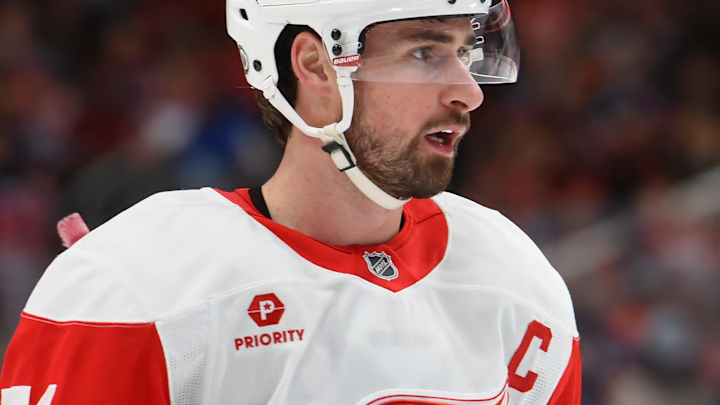The Captain America I’m referring to is neither Steve Rogers nor Auston Matthews.
No offense to them. Rogers isn’t real. Matthews possesses the most elite, pure talent of anyone on the Team USA roster. However, Dylan Larkin is the leader of Team USA.
Much like a shot, playmaking, or hockey IQ, leadership is an attribute in itself. It’s difficult to distinguish great leaders from their not-so-great counterparts, but much like any craft, it’s something that must be honed over time.
A leader has to go through challenges; oftentimes failing in his first ventures, he had to scrape and grind his way to the top. These obstacles only made him stronger, hungrier, and well-rounded as an individual. He learned how to rise above the troubles and helps his teammates do the same.
Larkin has gone through the ringer. Finally, he’s seeing the light at the end of a long, dark, winding tunnel and putting on a show for the entire world to see.
Detroit Red Wings captain Dylan Larkin gets set to lead Team USA in the Four Nations Face-Off
I’ve seen people pouring out their thoughts on whether the Detroit Red Wings should hang on to Larkin after this season. If they miss the playoffs, there is a group of people who think it’s reasonable that the team should move on from possibly Larkin and Steve Yzerman, the team’s general manager.
Seeing Yzerman’s commitment to the Detroit Red Wings organization as a whole, the length of time the previous rebuild took, and the Ilitch family’s trust in Yzerman, I think he’s got a longer leash than detractors may think. Unless the team really falls off the wagon, which hasn’t happened, I think Yzerman is the general manager as long as he wants. Given his track record as a player for the Red Wings, I think he would remain until he wins the Stanley Cups. The only question I would have at that point is how many Stanley Cups he would have to win before he retires from managing (though he might be like Jimmy Devellano, where he remains within the organization in a supervisory capacity).
As for Larkin, I’ve said it before, and I’ll say it again. When Yzerman returned to the Detroit Red Wings organization, he could have named Larkin captain right away. He didn’t, though, and waited a full year to name Larkin captain of the Detroit Red Wings.
Yzerman knows the Red Wings better than anyone. He knows the role that is asked of Hockeytown’s captain, the weight, the investment required, and even the suffering. Yzerman wasn’t going to hand the reins over to any player. The Detroit Red Wings organization is not like other organizations who name captains to name captains. It means something here, and the captains are here to stay. They’re not trade pieces. They are the leaders of the team in good and bad times for their careers.
The only way Larkin is moved at any time (regardless of when the Red Wings make the playoffs again) is if Larkin wants out.
I don’t know Larkin personally, but I can tell you what I’ve seen.
In the darkest of times, Larkin is a beacon of light cutting through fog, guiding his teammates to safety. He gives fans hope even when everything seems lost. Loyal, almost to a fault, Larkin invests in his team and creates a collaborative, competitive, and respectful environment for himself and his team.
Now, Larkin has shown his worth on the big stage.
Outside of Red Wings fandom, few hockey fans have a reason to spend their precious free time watching the Red Wings. Understandably, they haven’t been competititve in over a decade. Their skill level hasn’t been eye catching and the overall entertainment value hasn’t been there.
However, Larkin is playing as Larkin always plays. Fast, effective, efficient, and provides strong two-way play.
Even in a best on best tournament, Larkin is considered a third-line center—a much better rating than most hockey fans were giving him credit for before the tournament began.
Since drawing eyes, it seems like people are interested in having Larkin make a quick exit from Hockeytown as he is wasting his prime years.
I appreciate the draw that Larkin gives outsiders, but here’s the thing. Larkin didn’t invest all this time, effort, blood, sweat, and tears to a team only to exist just as the team rights the ship. He’s here to see it through to the end.
For those people saying he’s wasting his prime years, it may be so. However, I think back to Patrick Kane’s analogy of him and Larkin being on the back nine of their careers.
According to Larkin, he’s better on the back nine.
This idea seems silly, but it’s everything to me as a Detroit Red Wings fan. Larkin’s attitude embodies everything that I love about my team and captain.
From wanting to be a great teammate in this Four Nations Face-Off—not caring about what role he’s playing, the amount of ice time he gets, or the lack of his head coach understanding the value Larkin brings to the team, Larkin is the leader of Team USA.
He’s been the leader of the broken hearts in Motown for almost a decade now. While outsiders and certain Red Wings fans think these years were wasted, I reckon these years served as the foundation that has built the incredible player that plays for Team USA today.
I, for one, can’t wait to see him finish the back nine with his hometown team.
The only question that I have is how many?
